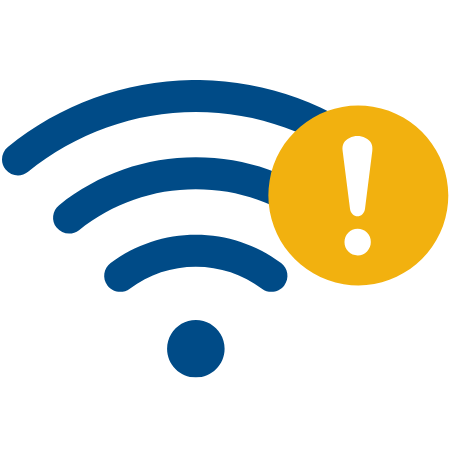Maximize Your Internet Speed: Tips to Get Your Full Speed
Wednesday March 19, 2025
Experiencing slower than expected Internet can be frustrating, especially when you need a fast connection for work, school, streaming, or browsing. There are several steps you can take to troubleshoot to ensure you are getting your full speed.
Check Your Equipment
The first step is to ensure that your equipment is functioning properly. Here’s what to check:
- Router: Make sure your router is plugged in securely and powered on. Sometimes, simply restarting this device can resolve speed issues. Unplug the router, wait for about 30 seconds, then plug it back in.
- Ethernet Cords, Wires, and Connections: Inspect all cords and wires connected to your router. Loose or damaged wiring can lead to connectivity issues and reduced speeds. Ensure everything is securely connected.
Test Your Internet Speed
Connect your computer directly to the Internet connection (bypassing the router). Close all of your open programs - if it uses the Internet, go ahead and shut it down. Visit www.btes.net/speedtest to run the speed test.
If you have Gigabit Internet, you should expect speeds of 940Mbps. To make a long (and very technical) story short, as with all Gigabit connections some of the bits are overhead including preamble, inter-frame gaps, and TCP which results in the maximum received speed of 940Mb.
Optimize Your Router’s Placement
The location of your router plays a crucial role in your internet speed. For optimal performance:
- Central Location: Place your router in a central location within your home to ensure even coverage. Avoid placing it near walls or obstructions that might interfere with the signal.
- Elevated Position: Position the router on a shelf or elevated surface rather than on the floor to improve signal distribution.
Manage Connected Devices
Having too many devices connected to your network can strain your bandwidth and slow down your Internet speed. To manage this:
- Disconnect, or power down, devices that are not in use.
- Check that unauthorized users are not connected to your network, as they can consume bandwidth and reduce your speed.
Update Your Equipment
Outdated equipment can also contribute to slow Internet speeds.
- Check for firmware updates for your router. Manufacturers often release updates to improve performance and fix bugs.
- If your router is several years old, consider upgrading to a newer model that supports the latest Wi-Fi standards (e.g., Wi-Fi 6).
Clear Browser Cache and Cookies
Sometimes, slow Internet speeds can be due to issues with your web browser. To address this, regularly clear your browser’s cache and cookies to improve loading times and performance.
Run a Malware Scan
Malware can significantly impact your internet speed. Run a thorough scan using reputable antivirus software to protect your system from harmful programs.
Contact Us
If you’ve tried all the above steps and your Internet still seems slow, our Technical Support is available 24/7 at 423-793-5555.
Get the latest to your inbox!
Enter your email below.
